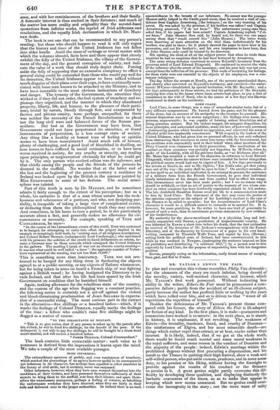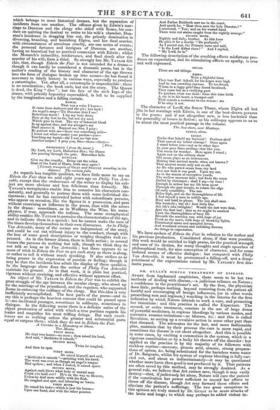MR. TAYLOR 5 EDWIN THE FAIR.
IN plan and execution this volume resembles Philip Van Artevelde ; but the elements of the story are much inferior, being devoid of the novelty, variety, well-marked character, and interest, which Mr. TAYLOR'S first work possessed. Without indicating less ability in the writer, Edwin the Fair must be pronounced a com- parative failure ; partly from the accident of an ill-chosen subject, partly because the author has profited little or nothing by the years which have rolled over him, and so is driven to that "worst of all repetitions the repetition of himself."
Besides the deficiencies of Mr. TAYLOR'S present theme com- pared with his former, the story of Edwin the Fair is ill-adapted for fiction of any kind. In the first place, it is stale—poetasters and romancists have worked it to tatters : in the next place, as it stands in history, it is unpleasant, if not revolting. The weakness of Edwin—the brutality, insolence, fraud, and cruelty of Dunstan— the misfortunes of Elgiva and her most miserable death—are things which rather repel than attract, or at best, excite rather than interest. It is likely, indeed, that if we got at the whole truth, there would be found much mental and some moral weakness in the royal sufferers, and some reason in the conduct of Dunstan and the majority of the people : indeed, Edwin's marriage within the prohibited degrees without first procuring a dispensation, and his insult to the Thanes in quitting their high festival, show a weak and self-willed person, who put aside custom, prudence, and in some sense duty, to his passion or his liking, without having the foresight to provide against the results of his conduct or the firmness to persist in it. A great genius might partly overcome this dif- ficulty by developing these qualities, and displaying distinctly the barbaric coarseness of the times, so as to make that appear in keeping which now seems. unnatural. But no genius could over- come the incongruity in the. story ; not the mere want of unity
which belongs to most historical dramas, but the separation of iocidents from one another. The offence given by Edwin's mar- riage to Dunstan and the clergy who sided with Rome, his con- duct on quitting the festival to retire to his wife's chamber, Dun- stan's insolence in dragging him out, the priestly domination in divorcing, branding, and banishing Elgiva, and her final murder, with circumstances of atrocious cruelty, are one series of events; the personal fortunes and intrigues of Dunstan are another, having an historical but no poetical connexion with Edwin; whilst the Monarch's imbecility, misfortunes, and final death after the murder of his wife, form a third. So strongly has Mr. TAYLOR felt this, that, though Edwin the Fair is not intended for a drama— though it can hardly be considered a dramatic poem, but is the author's reading of the history and character of the age thrown into the form of dialogue broken up into scenes—he has found it necessary to falsify history in various ways, especially to produce a catastrophe. Yet, after all, a catastrophe is unproducible : there is no termination ; the book ends, but not the story. The Queen is dead, the King" dies " ; but the fate of the arch Iago of the drama, with priestly hypocrisy superadded, is left to be supplied by the imagination and a falling curtain.
EDWIN.
That was a voice I knew—
It came from darkness and the pit ; but bark !
An angel's song—'Tis Dunstan that I see! Rebellious monk! I lay my body down Here at thy feet to die, but not my soul, Which goes to God. The cry of innocent blood Is up against thee, and the avenger's cry Shall answer it. Support me, Sirs, I pray
Be patient with me—there was something still—
I know not what—under your pardon—yes- Touching my burial—did I not see hut now Another corpse ? I pray you, Sirs—there—there- [ Dies.
ERIDFERTH (from the tower.)
My Lord, my Lord, Harcather flies ; the Danes Are pouring through the gate. Harcathcr falls.
DUNSTAN.
Give me the crucifix. Bring out the relics. Host of the Lord of Hosts, forth once again !
[Exeunt, trumpets of OLAF and SWEYNE sounding in the
distance. The curtain falls.
As regards less tangible qualities, we have little more to say on Edwin the Fair than we said eight years ago on Philip Van Arte- velde, except that the endeavours of the writer to display his sub- ject are more obvious and less felicitous than formerly. Mr. TAYLOR'S metaphysics enable him to conceive his characters con- sistently, and generally to portray them with some individual dis- tinctness; but he has succeeded better with subordinate persons, who appear on occasion, like the figures in a procession, and pass without exercising an influence in the poem, than with the actors in the drama : sometimes, as in Wulfstan the Wise, his meta- physics, if true, approach the tedious. The same metaphysical ability enables Mr. TAYLOR to perceive the characteristics of the age, and to indicate them in a speech : but he cannot make the men of the times develop themselves in their own discourses. As in Philip Van Artevelde, many of the scenes are independent of the story, and could be cut out without injury to the conduct, though with the loss of some good descriptions or weighty thoughts well ex- pressed. As in the former drama, there is little action ; in several scenes the persons do nothing but talk, though we think they do not talk so long as in Van Artevelde ; but there appears to us more of trick in Edwin the Fair to get such story as there is along, or rather to tell it without much speaking. It also strikes us as being poorer in the expression of passion or feeling; though it may be that the incidents less admit the display of these qualities. In the language alone does the author of Philip Van Artevelde maintain his ground. As in that work, it is plain but poetical, vigorous without straining, and effective without apparent effort.
An object of Mr. Tayr.on in Edwin the Fair was to exhibit the great struggle of the age between the secular clergy, who stood up for the marriage of the priesthood, and the regulars, who supported Rome in enforcing the celibacy of the clergy. But this idea is very inefficiently accomplished. The best parts of the poem—and to say this is perhaps the heaviest censure that could be passed upon it—are incidental passages, sometimes in soliloquy, sometimes in dialogue. In the following scene there is a delicate satire of the abject prostration of mind with which a true partisan regards his leader and magnifies his most trifling doings. But such excel- lences are as nothing unless the greater and substantial parts equal or surpass them • which they do not in Edwin the Fair.
A Corridor in a Monastery at Sheen. Two Monks.
FIRST MONK.
He slept two hours—no more; then raised his head, And said, "Methinks it raineth."
SECOND MONK.
Twice he coughed, And then he spat.
FIRST MONK.
He raised himself, and "Methinks it raineth "—pointing with his hand. The word was even as though an angel's tongue Had spoken ; and when I looked, it rained apace.
SECOND MONK.
Against such blows what body of mortal man Could e'er hold out ? He's on the way to Heaven, Unless he deal more mildly with his flesh. He coughed and spat, and labouring as 'twere.
FIRST MONK.
He raised his body—which is just his hones— Upon one hand, and with the other pointed. And Father Bridferth met use in the court,
And quoth he, " Hast thou seen the holy Dunstan ?" I answered, .4 Yes; and on his wasted hand
There were red stains caught from the nightly scourge."
SECOND MONK.
Nightly and daily, brother. At this hour He plies it for a double "Dc profundia" As I passed out, the Primate came and said, " Is the Lord Abbot risen?" And I replied, "My Lord, he is."
The following description of the crushing effects misfortune pro- duces on expectation, and its stimulating effects on apathy, is true and well expressed.
OSCAR.
These are sad tidings.
EMMA.
With a frightful force They tear Earl Athulf, for his hopes were high And he was crowding canvass. To his friend, Whom in a foggy grief they found becalmed, They come but as a vivifying gust To quicken what was dead: from this time forth A cry is in his heart, a trumpet-call That sounds a summons to the rescue: see If he obey it not.
The character of LeolC the Saxon Thane, whom Elgiva all but jilts in her marriage with Edwin, is one of the best-drawn persons in the poem ; and if not altogether new, is less hacknied than the generality of lovers in fiction ; as his soliloquy appears to us to be about the most poetical passage in the volume.
The Sea-shore, near Hastings. LEOLF, alone. LEOLF.
Rocks that beheld my boyhood ! Perilous shelf That nursed my infant courage! Once again I stand before you—not as in other days In your gray faces smiling—but like you, The worse for weather. Here again I stand ; Again and on the solitary shore Old ocean plays as on instrument, Making that ancient music, when not known ? That ancient music only not so old As He who parted ocean from dry land And saw that it was good. Upon my ear, As in the season of susceptive youth, The mellow murmur falls; but finds the sense Dulled by distemper ; shall I say—by time !
Enough in action has my life been spent Through the past decade, to rebate the edge Of early sensibility. The sun Rides high, and on the thoroughfares of life I find myself a man in middle age, Busy and hard to please. The sun shall soon Dip westerly ; but oh! how little like Are life's two twilights! Would the last were first, And the first last ; that so we might be soothed Upon the thoroughfares of busy life Beneath the noonday sun, with hope of joy Fresh as the morn, with hope of breaking lights, Illuminated mists and spangled lawns, And woodland orisons and unfolding flowers, As things in expectation.
We have spoken of Edwin the Fair in relation to the author and his previous production. Considered alone, if that were possible, this work would be entitled to high praise, for the poetical strength and ease of its diction, for many thoughts and single speeches of philosophical truth, for nice conception of character, and for Boole isolated scenes of effective dialogue : but compared with Philip Van Artevelde, it must be pronounced a falling-off, and a disap- pointment of the expectations raised by Mr. TavLoa's first dra- matic poem.



























 Previous page
Previous page